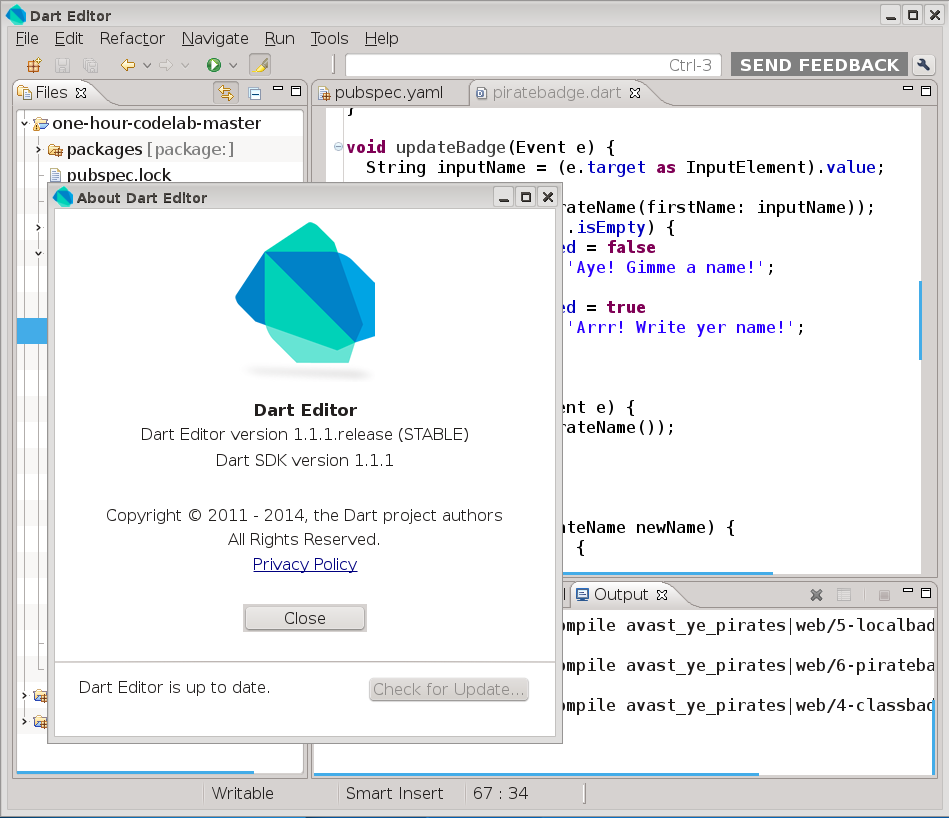Dart 1.1.1
Version of implementation Dart of programming language DartA version of Dart released on January 16, 2014

Dart Editor 1.1.1
Examples:
Hello, World! - Dart (485):
The “fat arrow” ( => expr; ) syntax is a shorthand for { return expr; }.
main() => print("Hello, World!");
Factorial - Dart (486):
This example uses recursive factorial definition. int datatype is an integer of arbitrary size.
int factorial(int n) => n == 0 ? 1 : n * factorial(n - 1);
main() {
for (int i = 0; i <= 16; ++i) {
print('$i! = ${factorial(i)}');
}
}
Factorial - Dart (487):
This example uses iterative factorial definition.
main() {
int fact = 1;
for (int i = 0; i <= 16; ++i, fact *= i) {
print('$i! = $fact');
}
}
Fibonacci numbers - Dart (488):
This example uses recursive definition of Fibonacci numbers. Note that the language requires explicit conversion from int to String.
int fibonacci(int n) => n <= 2 ? 1 : fibonacci(n - 2) + fibonacci (n - 1);
main() {
String output = "";
for (int i = 1; i <= 16; ++i) {
output += fibonacci(i).toString() + ", ";
}
print(output + "...");
}
Quadratic equation - Dart (489):
import 'dart:io';
import 'dart:math' show sqrt;
int readInt() {
String input = stdin.readLineSync();
return int.parse(input);
}
main() {
int A, B, C;
try {
A = readInt();
B = readInt();
C = readInt();
}
on FormatException {
print("Coefficient is not a number.");
return;
}
if (A == 0) {
print("Not a quadratic equation.");
return;
}
int D = B * B - 4 * A * C;
double p1 = - B / 2.0 / A;
double p2 = sqrt(D.abs()) / 2.0 / A;
if (D == 0) {
print("x = $p1");
} else {
if (D > 0) {
print("x1 = ${p1 + p2}");
print("x2 = ${p1 - p2}");
} else {
print("x1 = ($p1, $p2)");
print("x2 = ($p1, ${-p2})");
}
}
}
CamelCase - Dart (490):
splitMapJoin splits the string into parts that match the pattern and parts that don’t match it, converts each part using corresponding function (in this case capitalizes matches and removes non-matches), and combines the results into a new string.
import 'dart:io';
main() {
String text = stdin.readLineSync().toLowerCase();
String capitalize(Match m) => m[0].substring(0, 1).toUpperCase() + m[0].substring(1);
String skip(String s) => "";
print(text.splitMapJoin(new RegExp(r'[a-z]+'), onMatch: capitalize, onNonMatch: skip));
}
Comments
]]>blog comments powered by Disqus
]]>